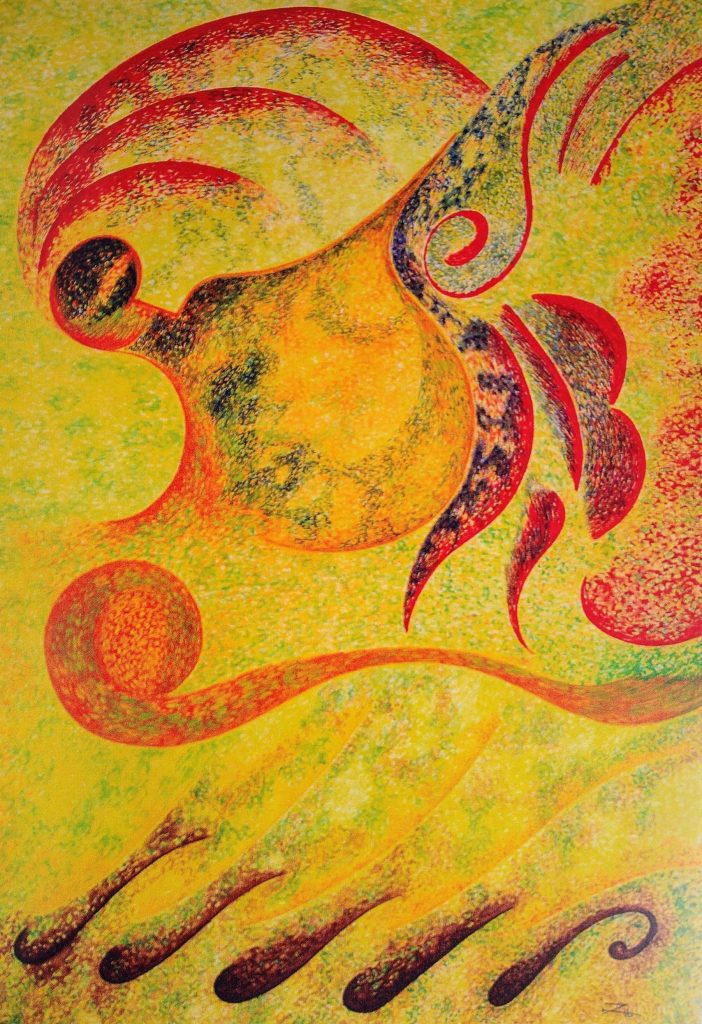The Botanical Mind: September 24th to December 23rd 2020 at the Camden Art Centre, Arkwright Road, London NW3
Curated by Gina Buenfeld and Martin Clark
The Botanical Mind: Art, Mysticism and the Cosmic Tree brings together the work of over 50 artists, spanning more than 500 years, to investigate the ongoing significance of the plant kingdom to human life, consciousness and spirituality. In doing so it highlights the subjectivity and being of plants, their influence on various knowledge-forms and wisdom-traditions, and how we engage with and activate them in culture, counter-culture, art and music.
Many of the works in the show revolve around the concept of the Axis Mundi (World Axis) or Cosmic Tree, a universal archetype that appears in the symbolism and mythologies of numerous religions. From the giant Ash, Yggdrasil, that connected the Nine Worlds of Norse mythology, to the ‘Tree of Knowledge’ in the Garden of Eden, or the Islamic ‘Tree of Immortality’ – again and again the human condition is connected to the physical and transcendental universe through the image of a plant.
The exhibition will bring together an extraordinary presentation of trans-cultural art and artefacts, revealing an encoded intelligence inherent in plant forms – patterns that can be thought of as blueprints for the natural world. These same patterns relate to ancient metaphysical beliefs shared by diverse cultures globally, manifest in the connected principles of micro- and macro-cosmos, sacred and fractal geometries, and the psychoactive visions induced by mind-manifesting plant medicines. Alongside works by contemporary artists, the exhibition also presents visionary, surrealist, modernist and outsider artists, as well as rare books and manuscripts, antiquarian botanicals, Tantric Yantras, Jain and Hindu cosmological diagrams and Tibetan mandalas. Meditating on the role of archetypal images, symbolism and pattern in conveying the place of plants in different worldviews, it brings together both the sacred and secular in an expanded philosophical and ethical engagement with non-human entities.
Today, there is a greater urgency than ever to reconsider our relationship with the natural world. The Botanical Mind proposes a dialogue with alternative worldviews to test the everyday assumptions we make as part of our own. Opening up a territory of research focusing on native animist cosmologies and their deeply entwined relationship with plants, italso looks back to the heritage of a contemporary European worldview, exploring the beliefs that existed before our culture was shaped by the scientific revolution and reappraising the ancestral wisdom traditions that were driven underground by the same colonial values of ‘reason’ and ‘progress’ that destroyed indigenous cultures abroad.
We have been working closely with the Yawanawá community – an indigenous people living in the Amazon Rainforest – to develop a site-specific artwork that celebrates their kené (sacred designs) and music. Passed through ancestral lines, these traditions connect them to the rainforest in which they live and this deeply entwined relationship with plants highlights the way in which music and visual abstraction are active technologies for communicating with a more-than-human world. The community is now in self-isolation in their sacred village in the forest, and more news about this commission will follow in due course.
Originally conceived as an exhibition – now rescheduled for September 2020 when our galleries reopen – the project continues to grow into new forms and will now launch online in May 2020. Including a new series of podcasts, films, music, images, writing and commissions, artists and thinkers will expand on many of the ideas and issues raised in The Botanical Mind, issues that are now more relevant than ever.
A 224-page fully illustrated publication will be launched as a companion to the overall project, including essays by the curators and contributions from scholars from the main areas covered by the exhibition: alchemy; art history; plant ontology; Gaian ecology; anthropology; and ethnobotany. It will be available to buy online as a resource for people enjoying the online content from home as well as accompanying the exhibition later in the year.
Eileen Agar / Anni Albers / Josef Albers / Consuelo Chelo Gonzalez Amezcuelo Amexcua / Gemma Anderson with Wakefield Lab and John Dupré / Anna Atkins / Jordan Belson / Annie Bessant and Charles Leadbeater / Karl Blossfeldt / Carol Bove / Kerstin Brätsch / Andrea Büttner / Santiago Ramon y Cajal / Adam Chodzko / Ithell Colquhoun / Bruce Conner / Das Institut / Mirtha Dermisache / Minnie Evans / Cerith Wyn Evans / Charles Filiger / Robert Fludd / Giorgio Griffa / Brion Gysin / Friedrich Wilhelm Heine / Ernst Haeckel / Anna Haskel / Tamara Henderson / Channa Horwitz / Textiles from the Huni Kuin (Kaxinawa) people/ C.G. Jung / Joachim Koester / Rachid Koraïchi / Hilma Af Klint / Emma Kunz / Yves Laloy / Ghislaine Leung / Linder / Simon Ling / André Masson / John McCracken / Henri Michaux / Matt Mullican / Wolfgang Paalen / Paul Paun / Steve Reinke and James Richards / Edith Rimmington / Daniel Rios Rodriguez / Textiles and ceramics from the Shipibo-Conibo people / Penny Slinger / F. Percy Smith / Janet Sobel / Philip Taaffe / Fred Tomaselli / Delfina Muñoz de Toro / Alexander Tovborg / David Tudor / Lee Ufan / Scottie Wilson / Terry Winters / Adolf Wölfli / Bryan Wynter / Henriette Zéphir / Anna Zemankova / Unica Zurn / Deuzimar Peu Yawanawá / Tsatsawanu Yawanawá / Xinayura Yawanawá
The forthcoming exhibition is generously supported by Neville Shulman CBE and Emma Shulman.
